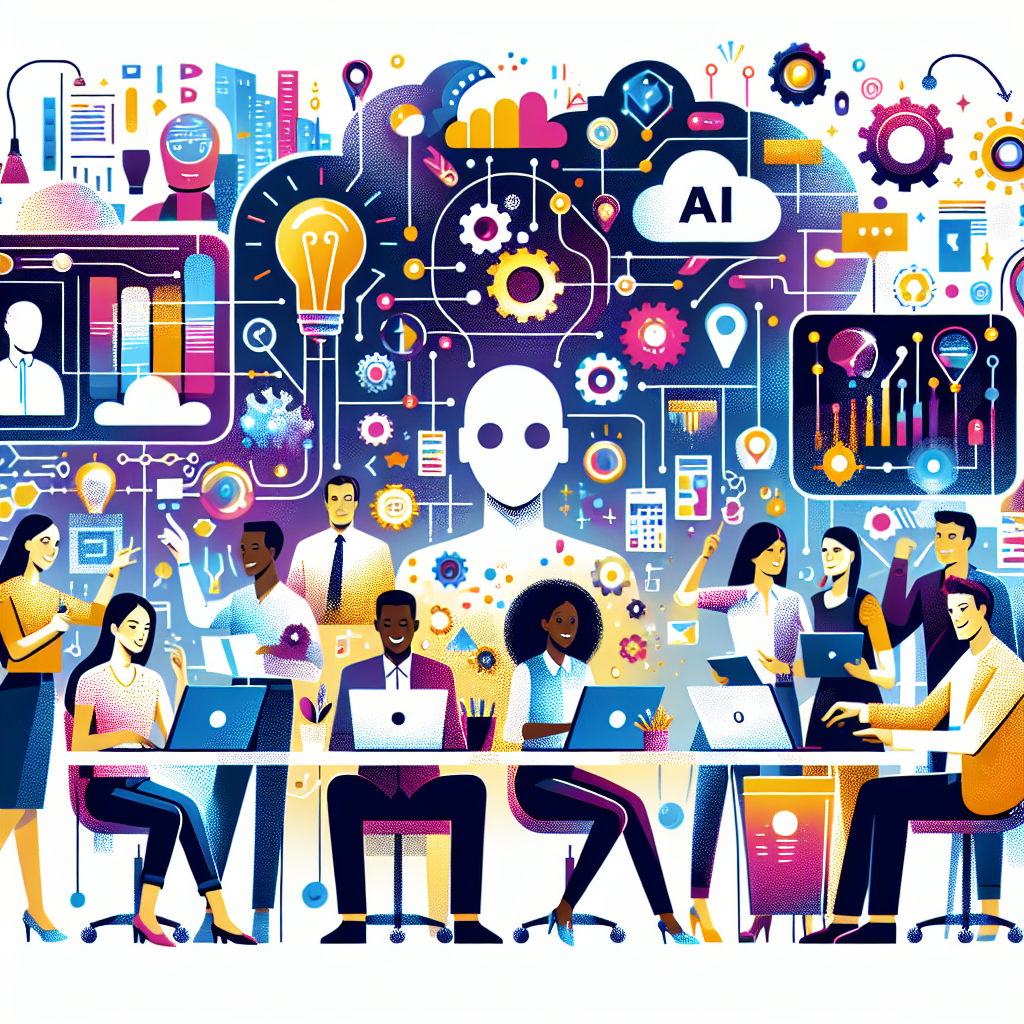AI washing is a term that has emerged to describe the phenomenon where companies exaggerate or misrepresent their use of artificial intelligence (AI) technologies. This issue gained significant attention when Amazon faced scrutiny over its “Just Walk Out” technology in its grocery stores. Although this system is designed to allow customers to shop without traditional checkout processes, reports revealed that a substantial number of transactions were still being manually verified by workers in India. Amazon defended its technology by asserting that the workers were not reviewing every transaction but were instead involved in system oversight, highlighting the complexities surrounding the actual implementation of AI.
The concept of AI washing draws parallels to “greenwashing,” where companies falsely claim to be environmentally friendly. The term reflects a growing concern that businesses may be overstating their AI capabilities to appear more innovative and competitive. While AI generally refers to computer systems that can learn and solve problems, the specific type of AI that has garnered attention recently is generative AI, which creates new content, such as text, music, or images. This has led to an increase in companies claiming to utilize AI, even when their actual technology may not be as advanced as advertised.
Research indicates that the trend of AI washing is not new; a 2019 study found that 40% of companies labeling themselves as “AI start-ups” were not using AI at all. The situation has evolved, with many firms now integrating basic AI functionalities, such as chatbots, into their existing software without fully developing AI systems. This trend is fueled by the competitive landscape of tech start-ups, where mentioning AI in pitches has become almost essential for attracting investment, regardless of the actual role AI plays in their products.
The lack of a universally accepted definition of AI exacerbates the problem of AI washing. Different interpretations of what constitutes AI lead to ambiguity, making it difficult for investors and consumers to discern which companies are genuinely leveraging advanced AI technologies. This confusion can result in businesses overpaying for technology that does not meet their operational needs, while also eroding consumer trust in companies that are genuinely innovating in the AI space. Regulatory bodies, particularly in the United States, are beginning to take action against misleading claims related to AI, indicating a shift towards greater accountability in this area.
As the discussion around AI continues to evolve, experts warn against the blind adoption of AI technologies without considering their appropriateness for specific tasks. The environmental impact of AI is another critical aspect that is often overlooked, as the technology contributes significantly to climate change. In the long run, as AI becomes more commonplace, the term “AI-powered” may lose its significance as a marketing tool, similar to how the internet has become an expected feature rather than a unique selling point. This shift may help mitigate the issue of AI washing, as the focus will likely move towards the practical applications and benefits of AI in various sectors.
Original news source: What is ‘AI washing’ and why is it a problem? (BBC)
🎧 Listen:
Slow
Normal
Fast
📖 Vocabulary:
| 1 | phenomenon | An observable event or occurrence, especially one that is remarkable or unusual |
| 2 | scrutiny | Close and critical examination or observation |
| 3 | transactions | Instances of buying or selling something; business deals |
| 4 | oversight | Supervision or management, especially to ensure proper functioning |
| 5 | parallels | Similarities or comparisons between two things |
| 6 | overstating | Representing something as more significant or important than it actually is |
| 7 | capabilities | The qualities or abilities that enable someone or something to perform a function |
| 8 | generative | Relating to the creation of new content, such as text, music, or images |
| 9 | integrating | Combining or incorporating parts into a whole |
| 10 | ambiguity | Uncertainty or lack of clarity |
| 11 | discern | To perceive or recognize something clearly |
| 12 | leveraging | Using something to maximum advantage |
| 13 | regulatory | Relating to rules or laws that control or govern behavior |
| 14 | accountability | The state of being responsible or answerable for something |
| 15 | mitigate | To make something less severe or intense |
Group or Classroom Activities
Warm-up Activities:
– NEWS REPORTER ROLE-PLAY
Instructions: Divide the class into small groups and assign each group the role of a news reporting team. They must create a short news segment summarizing the key points of the article about AI washing. Each group will present their segment to the class, using appropriate reporting language and techniques.
– OPINION POLL
Instructions: Conduct a class-wide opinion poll on the topic of AI washing. Prepare a series of questions related to the article, such as “Do you think companies exaggerate their AI capabilities?” or “How significant do you believe the impact of AI washing is on consumer trust?” Students will anonymously submit their responses, which will then be discussed collectively.
– MIND MAP
Instructions: On a large piece of paper or a whiteboard, create a mind map as a class. Start with the central theme of “AI Washing” and branch out to include related concepts, such as “greenwashing,” “consumer trust,” “investment,” and “AI technology.” Encourage students to contribute ideas and connections based on the article.
– KEYWORD TABOO
Instructions: Choose key vocabulary words from the article related to AI washing and write them on cards. In pairs, one student will describe the word without using it or any related terms while the other guesses. This activity will help students deepen their understanding of the vocabulary in context.
– FUTURE PREDICTIONS
Instructions: Ask students to think about the future of AI technology and how AI washing might evolve. In small groups, they will discuss and write down their predictions, considering both potential positive and negative outcomes. Each group will then share their predictions with the class for further discussion.
🤔 Comprehension Questions:
1. What is the primary concern associated with AI washing as described in the article?
2. How did Amazon respond to the scrutiny regarding its “Just Walk Out” technology?
3. In what way does AI washing relate to the concept of greenwashing?
4. What specific type of AI has been gaining attention recently, and what does it create?
5. What findings did a 2019 study reveal about companies identifying themselves as “AI start-ups”?
6. Why is the lack of a universally accepted definition of AI problematic for investors and consumers?
7. What actions are regulatory bodies in the United States beginning to take regarding misleading claims about AI?
8. How might the term “AI-powered” change in significance as AI technology becomes more commonplace?
Go to answers ⇩
🎧✍️ Listen and Fill in the Gaps:
AI washing is a term that has emerged to describe the phenomenon where companies exaggerate or misrepresent their use of artificial intelligence (AI) technologies. This issue gained (1)______ attention when (2)______ faced scrutiny over its “Just Walk Out” technology in its grocery stores. Although this system is designed to allow customers to shop without (3)______ checkout processes, reports revealed that a substantial number of transactions were still being manually verified by workers in India. Amazon defended its technology by asserting that the workers were not reviewing every transaction but were instead involved in system oversight, highlighting the complexities surrounding the actual (4)______ of AI.
The concept of AI washing draws parallels to “greenwashing,” where companies falsely claim to be environmentally friendly. The term reflects a growing concern that businesses may be overstating their AI capabilities to appear more innovative and competitive. While AI generally refers to computer systems that can learn and solve problems, the specific type of AI that has garnered attention recently is generative AI, which creates new content, such as text, (5)______, or images. This has led to an (6)______ in companies claiming to utilize AI, even when their actual technology may not be as advanced as advertised.
Research indicates that the trend of AI washing is not new; a 2019 study found that 40% of companies labeling themselves as “AI start-ups” were not using AI at all. The (7)______ has evolved, with many (8)______ now integrating basic AI functionalities, such as chatbots, into their existing software without fully developing AI systems. This trend is fueled by the competitive landscape of tech start-ups, where mentioning AI in pitches has become almost essential for attracting investment, regardless of the (9)______ role AI plays in their products.
The lack of a universally accepted definition of AI (10)______ the problem of AI washing. Different interpretations of what constitutes AI lead to ambiguity, making it difficult for investors and consumers to discern which companies are genuinely leveraging advanced AI technologies. This confusion can result in businesses overpaying for technology that does not meet their operational needs, while also (11)______ consumer trust in companies that are genuinely innovating in the AI space. Regulatory bodies, particularly in the (12)______ States, are beginning to take action against misleading claims related to AI, indicating a shift towards greater accountability in this area.
As the discussion around AI continues to evolve, experts warn against the blind adoption of AI technologies without considering their appropriateness for specific (13)______. The environmental impact of AI is another critical aspect that is often overlooked, as the technology contributes significantly to climate change. In the long run, as AI (14)______s more commonplace, the term “AI-powered” may lose its significance as a marketing tool, similar to how the internet has become an expected feature rather than a unique selling point. This shift may help mitigate the issue of AI washing, as the focus will likely move towards the (16)______ applications and benefits of AI in various sectors.
Go to answers ⇩
💬 Discussion Questions:
Students can ask a partner these questions, or discuss them as a group.
1. What is your opinion on the concept of AI washing? Do you think it is a serious issue in the tech industry? Why or why not?
2. How would you feel if a company you trusted was found to be exaggerating its use of AI technology?
3. Do you think that consumers should be more informed about the technologies companies claim to use? Why or why not?
4. What is a personal experience you have had with a product or service that claimed to use advanced technology but did not meet your expectations?
5. How do you think the trend of AI washing might affect innovation in the tech industry in the long run?
6. Do you like the idea of generative AI creating new content, such as music or art? Why or why not?
7. How would you feel if you discovered that a significant number of companies you admire were not using AI as they claimed?
8. Do you think that regulatory bodies should impose stricter rules on how companies advertise their use of AI? Why or why not?
9. What is your perspective on the environmental impact of AI? Do you believe it is being adequately addressed by companies?
10. How would you feel if AI technologies were implemented in your workplace? Do you see it as a benefit or a potential risk?
11. Do you think the term “AI-powered” will eventually lose its appeal to consumers? Why or why not?
12. What is a potential consequence of companies overstating their AI capabilities on consumer trust?
13. How do you feel about the competitive pressure on start-ups to label themselves as “AI” companies? Do you think it’s justified?
14. Do you think that the ambiguity surrounding the definition of AI is a problem for consumers? Why or why not?
15. What is your opinion on the ethical implications of using AI in business? Should companies prioritize ethics over profits? Why or why not?
Individual Activities
📖💭 Vocabulary Meanings:
Match each word to its meaning.
Words:
1. phenomenon
2. scrutiny
3. transactions
4. oversight
5. parallels
6. overstating
7. capabilities
8. generative
9. integrating
10. ambiguity
11. discern
12. leveraging
13. regulatory
14. accountability
15. mitigate
Meanings:
(A) To make something less severe or intense
(B) Similarities or comparisons between two things
(C) Combining or incorporating parts into a whole
(D) The state of being responsible or answerable for something
(E) Representing something as more significant or important than it actually is
(F) Relating to the creation of new content, such as text, music, or images
(G) Using something to maximum advantage
(H) An observable event or occurrence, especially one that is remarkable or unusual
(I) To perceive or recognize something clearly
(J) Relating to rules or laws that control or govern behavior
(K) The qualities or abilities that enable someone or something to perform a function
(L) Supervision or management, especially to ensure proper functioning
(M) Uncertainty or lack of clarity
(N) Instances of buying or selling something; business deals
(O) Close and critical examination or observation
Go to answers ⇩
🔡 Multiple Choice Questions:
1. What does the term “AI washing” refer to?
(a) The process of cleaning data for AI models
(b) Exaggerating or misrepresenting the use of artificial intelligence technologies
(c) A method of training AI systems
(d) The integration of AI in environmental practices
2. Which company faced scrutiny over its “Just Walk Out” technology?
(a) Google
(b) Microsoft
(c) Apple
(d) Amazon
3. What is generative AI known for?
(a) Analyzing big data sets
(b) Automating customer service responses
(c) Creating new content such as text, music, or images
(d) Enhancing cybersecurity measures
4. According to a 2019 study, what percentage of companies labeled as “AI start-ups” were not using AI at all?
(a) 40%
(b) 25%
(c) 60%
(d) 10%
5. What is one reason companies might engage in AI washing?
(a) To reduce operational costs
(b) To comply with regulatory standards
(c) To enhance employee training programs
(d) To appear more innovative and competitive
6. What complicates the issue of AI washing?
(a) The high cost of AI technologies
(b) The rapid pace of technological change
(c) The lack of a universally accepted definition of AI
(d) The limited availability of AI talent
7. What is a potential consequence of AI washing for consumers?
(a) Erosion of trust in genuinely innovative companies
(b) Increased prices for AI products
(c) Greater access to AI technologies
(d) Improved understanding of AI capabilities
8. What aspect of AI is often overlooked, according to experts?
(a) Its cost-effectiveness
(b) Its environmental impact
(c) Its user-friendliness
(d) Its historical development
Go to answers ⇩
🕵️ True or False Questions:
1. Generative AI, which creates new content like text and images, has not contributed to the rise of companies claiming to utilize AI.
2. The term AI washing is compared to greenwashing, where companies falsely claim to be environmentally friendly.
3. A 2019 study found that 40% of companies identifying as “AI start-ups” were not actually using AI technologies.
4. Regulatory bodies in the United States are starting to take action against misleading claims related to AI.
5. AI washing refers to the exaggeration or misrepresentation of a company’s use of artificial intelligence technologies.
6. Amazon’s “Just Walk Out” technology faced scrutiny for fully automating transactions, as many were still manually verified by workers.
7. The presence of a universally accepted definition of AI simplifies the ability to identify companies genuinely using advanced AI.
8. Experts advise for the uncritical adoption of AI technologies without assessing their suitability for specific tasks.
Go to answers ⇩
📝 Write a Summary:
Write a summary of this news article in two sentences.
Check your writing now with the best free AI for English writing!
Writing Questions:
Answer the following questions. Write as much as you can for each answer.
Check your answers with our free English writing assistant!
1. What are some examples of companies that have been accused of AI washing, and what specific claims have they made about their AI technologies?
2. How does the phenomenon of AI washing compare to greenwashing, and what implications does this have for consumer trust?
3. What challenges do investors and consumers face in distinguishing between companies that genuinely utilize advanced AI and those that exaggerate their capabilities?
4. In what ways are regulatory bodies responding to the issue of misleading claims related to AI, and what impact might this have on the industry?
5. How might the perception of AI technologies change in the future, and what factors could contribute to this shift?
✅ Answers
🤔✅ Comprehension Question Answers:
1. What is the primary concern associated with AI washing as described in the article?
The primary concern associated with AI washing is that companies exaggerate or misrepresent their use of artificial intelligence technologies to appear more innovative and competitive.
2. How did Amazon respond to the scrutiny regarding its “Just Walk Out” technology?
Amazon responded by asserting that the workers involved in verifying transactions were not reviewing every transaction but were instead engaged in system oversight, highlighting the complexities of AI implementation.
3. In what way does AI washing relate to the concept of greenwashing?
AI washing draws parallels to greenwashing in that both involve companies falsely claiming to possess certain attributes—in this case, AI capabilities—to enhance their market image and competitiveness.
4. What specific type of AI has been gaining attention recently, and what does it create?
The specific type of AI gaining attention recently is generative AI, which creates new content such as text, music, or images.
5. What findings did a 2019 study reveal about companies identifying themselves as “AI start-ups”?
The 2019 study found that 40% of companies labeling themselves as “AI start-ups” were not using AI at all.
6. Why is the lack of a universally accepted definition of AI problematic for investors and consumers?
The lack of a universally accepted definition of AI creates ambiguity, making it difficult for investors and consumers to discern which companies are genuinely leveraging advanced AI technologies, leading to potential overpayment and eroded trust.
7. What actions are regulatory bodies in the United States beginning to take regarding misleading claims about AI?
Regulatory bodies in the United States are beginning to take action against misleading claims related to AI, indicating a shift towards greater accountability in this area.
8. How might the term “AI-powered” change in significance as AI technology becomes more commonplace?
As AI technology becomes more commonplace, the term “AI-powered” may lose its significance as a marketing tool, similar to how the internet has become an expected feature rather than a unique selling point.
Go back to questions ⇧
🎧✍️✅ Listen and Fill in the Gaps Answers:
(1) significant
(2) Amazon
(3) traditional
(4) implementation
(5) music
(6) increase
(7) situation
(8) firms
(9) actual
(10) exacerbates
(11) eroding
(12) United
(13) tasks
(14) become
(15) becomes
(16) practical
Go back to questions ⇧
📖💭✅ Vocabulary Meanings Answers:
1. phenomenon
Answer: (H) An observable event or occurrence, especially one that is remarkable or unusual
2. scrutiny
Answer: (O) Close and critical examination or observation
3. transactions
Answer: (N) Instances of buying or selling something; business deals
4. oversight
Answer: (L) Supervision or management, especially to ensure proper functioning
5. parallels
Answer: (B) Similarities or comparisons between two things
6. overstating
Answer: (E) Representing something as more significant or important than it actually is
7. capabilities
Answer: (K) The qualities or abilities that enable someone or something to perform a function
8. generative
Answer: (F) Relating to the creation of new content, such as text, music, or images
9. integrating
Answer: (C) Combining or incorporating parts into a whole
10. ambiguity
Answer: (M) Uncertainty or lack of clarity
11. discern
Answer: (I) To perceive or recognize something clearly
12. leveraging
Answer: (G) Using something to maximum advantage
13. regulatory
Answer: (J) Relating to rules or laws that control or govern behavior
14. accountability
Answer: (D) The state of being responsible or answerable for something
15. mitigate
Answer: (A) To make something less severe or intense
Go back to questions ⇧
🔡✅ Multiple Choice Answers:
1. What does the term “AI washing” refer to?
Answer: (b) Exaggerating or misrepresenting the use of artificial intelligence technologies
2. Which company faced scrutiny over its “Just Walk Out” technology?
Answer: (d) Amazon
3. What is generative AI known for?
Answer: (c) Creating new content such as text, music, or images
4. According to a 2019 study, what percentage of companies labeled as “AI start-ups” were not using AI at all?
Answer: (a) 40%
5. What is one reason companies might engage in AI washing?
Answer: (d) To appear more innovative and competitive
6. What complicates the issue of AI washing?
Answer: (c) The lack of a universally accepted definition of AI
7. What is a potential consequence of AI washing for consumers?
Answer: (a) Erosion of trust in genuinely innovative companies
8. What aspect of AI is often overlooked, according to experts?
Answer: (b) Its environmental impact
Go back to questions ⇧
🕵️✅ True or False Answers:
1. Generative AI, which creates new content like text and images, has not contributed to the rise of companies claiming to utilize AI. (Answer: False)
2. The term AI washing is compared to greenwashing, where companies falsely claim to be environmentally friendly. (Answer: True)
3. A 2019 study found that 40% of companies identifying as “AI start-ups” were not actually using AI technologies. (Answer: True)
4. Regulatory bodies in the United States are starting to take action against misleading claims related to AI. (Answer: True)
5. AI washing refers to the exaggeration or misrepresentation of a company’s use of artificial intelligence technologies. (Answer: True)
6. Amazon’s “Just Walk Out” technology faced scrutiny for fully automating transactions, as many were still manually verified by workers. (Answer: False)
7. The presence of a universally accepted definition of AI simplifies the ability to identify companies genuinely using advanced AI. (Answer: False)
8. Experts advise for the uncritical adoption of AI technologies without assessing their suitability for specific tasks. (Answer: False)
Go back to questions ⇧















